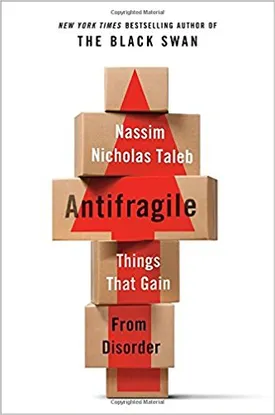Antifragile: Things That Gain from Disorder by Nassim Taleb
Nassim Taleb’s book Antifragile—Things that Gain from Disorder is a manifesto on the necessity of chaos, disorder, and adversity in forging a society’s progress. Taleb proposes an alternate view of the world, in which he believes that some aspects of life actually benefit from volatility, chaos, and randomness or what he calls ‘antifragility’. In this highly acclaimed book, Taleb provides a sophisticated and thought-provoking account of the idea of antifragility in all aspects of life, and particularly in financial, emotional, political, and social events.
In the book, Taleb starts with a simple premise; that life is a series of events and occurrences, some of which are beneficial to our growth and some of which cause harm to us in one way or another. He explains that just as it is desirable to avoid harm, it is also important to identify and pursue positive events, risks and challenges that bring benefit. He goes on to define 'antifragility' as the ability of certain elements within life to benefit from disorder or disruption.
Taleb supports his thesis by explaining several economic, philosophical, and scientific theories that explain the benefits of disorder and volatility. He then explains why many people are reluctant to embrace an antifragile outlook; these include fear, ignorance and mismanagement of resources. His main argument is that allowing volatility and chaos to occur in certain aspects of life is essential to progress. He uses many examples from history, such as the Roman Empire and the reformation of Christianity, to show how embracing uncertainty can actually lead to advances in knowledge, productivity and financial stability.
Taleb then goes on to explain how improvements in technology and scientific processes can be made through antifragile risk taking. He explains how resilience and antifragility are intrinsically linked, and how embracing disorder and unpredictability can lead to greater innovation. He points to systems and companies that have successfully implemented antifragility, such as Uber, as evidence of the power of non-linear thinking. He further points to the financial markets as another example of how a system can be improved through antifragility.
Overall, Taleb makes a strong argument in favor of embracing antifragile concepts in all aspects of life. While doing so involves a certain amount of risk, Taleb believes that it is necessary for progress. In Antifragile— Things that Gain from Disorder Taleb provides a thought-provoking look at the benefits of chaos and uncertainty, and a useful insight into how to better navigate and benefit from it. The book serves as an important reminder of the importance of embracing uncertainty and volatility in order to make progress, and provides a philosophical twist to economic and scientific theory.

